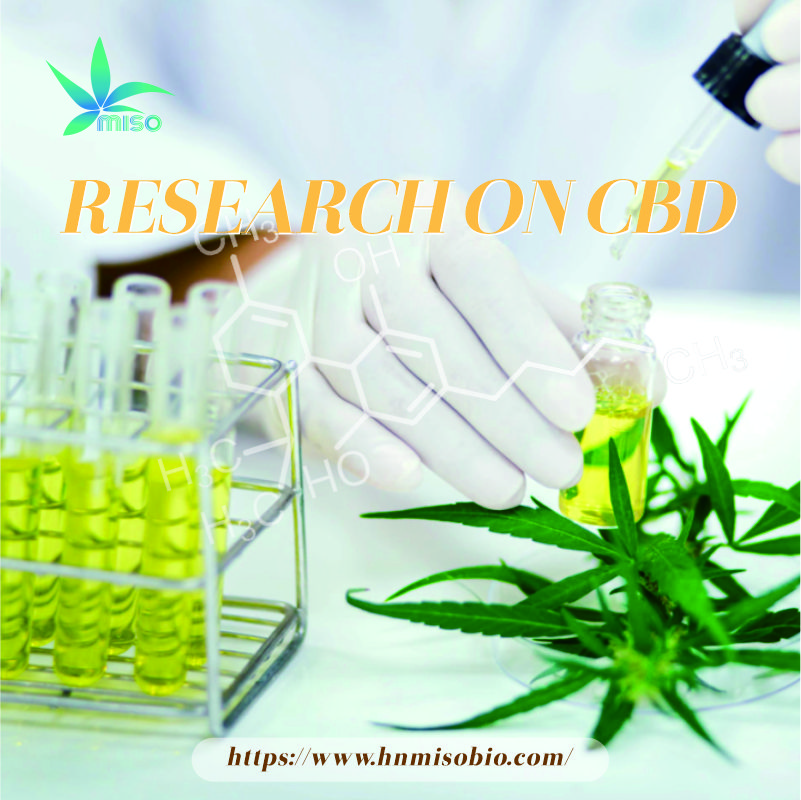"Exploration of the potential role of cannabidiol (CBD) in the treatment of pneumonia"
1. Pneumonia and Cannabidiol (CBD)
Pneumonia is a common infectious disease of the lungs caused by various pathogens such as bacteria, viruses, and fungi. The incidence and mortality rates of pneumonia remain high globally, particularly among the elderly, children, and individuals with weakened immune systems. Current treatments for pneumonia mainly include antibiotics, antiviral medications, and supportive therapies. However, for some severe pneumonia cases, the treatment outcomes may be unsatisfactory, and there can be issues such as adverse drug reactions and resistance. Therefore, finding new and effective treatment methods for pneumonia is of significant clinical importance.
Cannabidiol (CBD) is a natural compound extracted from industrial hemp with various pharmacological effects, including anti-inflammatory, antioxidant, anticonvulsant, and anxiolytic properties. In recent years, increasing research has shown that CBD has potential therapeutic value in a range of diseases, including neurological disorders, cardiovascular diseases, and inflammatory diseases. However, the role of CBD in the treatment of pneumonia has not been thoroughly studied. This paper aims to explore the potential role of CBD in the treatment of pneumonia, offering new ideas and methods for its management.
2. Chemical Properties and Pharmacological Effects of CBD

(1) Chemical Properties
CBD is a colorless, tasteless, and odorless crystal with the chemical name (-)-cannabidiol. It is an important member of the cannabinoid family and, unlike tetrahydrocannabinol (THC), CBD does not have psychoactive effects and does not produce a "high." The chemical structure of CBD includes a benzene ring, a cyclohexene ring, two hydroxyl groups, and a methyl group. These structural features determine CBD's pharmacological effects.
(2) Pharmacological Effects
1. Anti-inflammatory Effects
CBD has significant anti-inflammatory properties and can inhibit the production and release of various inflammatory factors, such as tumor necrosis factor-alpha (TNF-α), interleukin-1β (IL-1β), and interleukin-6 (IL-6). These inflammatory factors play a crucial role in the development of pneumonia, causing inflammation in lung tissues, leading to thickening of alveolar walls, interstitial edema, and increased exudates in alveoli. CBD can alleviate lung tissue inflammation by inhibiting the production and release of these inflammatory factors, thereby protecting lung tissues from damage.
2. Antioxidant Effects
CBD possesses strong antioxidant properties and can scavenge free radicals in the body, reducing oxidative stress damage. Oxidative stress also plays an important role in the pathogenesis of pneumonia, leading to oxidative damage to lung tissues, such as lipid peroxidation of cell membranes, protein oxidation, and DNA damage. By eliminating free radicals, CBD can reduce oxidative stress damage to lung tissues, protecting them from oxidative injury.
3. Immunomodulatory Effects
CBD has certain immunomodulatory effects and can regulate the immune system's function, enhancing the body's immune response. Immune system dysfunction is one of the significant factors that worsen the condition of pneumonia. CBD can improve the immune system's function, strengthen the body's immunity, resist pathogen infections, and reduce lung tissue damage.
4. Protective Effects on Lung Tissue
CBD can directly act on lung tissues, protecting them from damage. Studies have shown that CBD can inhibit inflammatory cell infiltration in lung tissues, reduce alveolar wall thickening, decrease interstitial edema, and lower the content of exudates in alveoli, thereby protecting lung tissues from damage.
3. Potential Role of CBD in the Treatment of Pneumonia

(1) Suppression of Inflammatory Response
Inflammatory response is one of the primary causes of lung tissue damage in the pathogenesis of pneumonia. CBD has significant anti-inflammatory effects and can inhibit the production and release of various inflammatory factors, thereby reducing the inflammatory response in lung tissues. Studies have shown that CBD can suppress the production and release of inflammatory factors such as TNF-α, IL-1β, and IL-6, decrease the degree of inflammatory cell infiltration, and alleviate pathological changes such as thickening of alveolar walls, interstitial edema, and increased alveolar exudates. Therefore, CBD holds promise as a new anti-inflammatory agent for the treatment of pneumonia.
(2) Antioxidant Stress
Oxidative stress also plays an important role in the development of pneumonia, causing oxidative damage to lung tissues, including lipid peroxidation of cell membranes, protein oxidation, and DNA damage. CBD has strong antioxidant properties and can scavenge free radicals in the body, reducing oxidative stress damage. Research indicates that CBD can enhance the activity of antioxidant enzymes and lower oxidative stress markers such as malondialdehyde (MDA), superoxide dismutase (SOD), and glutathione peroxidase (GSH-Px), thus mitigating oxidative stress damage to lung tissues. Consequently, CBD is expected to be a promising new antioxidant drug for the treatment of pneumonia.
(3) Immune System Modulation
Dysfunction of the immune system is a significant factor in the exacerbation of pneumonia. CBD has certain immunomodulatory effects and can regulate immune system functions, enhancing the body's immune response. Studies have shown that CBD can modulate the activity of immune cells such as T cells, B cells, and macrophages, promote the proliferation and differentiation of immune cells, and boost the body's immunity. Therefore, CBD holds potential as a new immunomodulatory drug for the treatment of pneumonia.
(4) Protection of Lung Tissue
CBD can directly act on lung tissues to protect them from damage. Research has demonstrated that CBD can inhibit inflammatory cell infiltration in lung tissues, reduce alveolar wall thickening, decrease interstitial edema, and lower the content of exudates in alveoli, thereby protecting lung tissues from damage. Additionally, CBD can promote the repair and regeneration of lung tissues and enhance lung function. Thus, CBD is anticipated to be a promising new drug for protecting lung tissues in the treatment of pneumonia.
4. Current Research Status of CBD in the Treatment of Pneumonia

Currently, research on the use of CBD in the treatment of pneumonia is still in its preliminary stages. Although some studies have indicated that CBD has certain anti-inflammatory, antioxidant, immunomodulatory, and lung-protective effects, most of these studies have been conducted in animal models or in vitro experiments, lacking support from clinical research. Additionally, issues related to CBD dosage, administration routes, and safety still require further investigation.
(1) Animal Model Studies
In animal models, researchers have observed the therapeutic effects of CBD on pneumonia. For instance, one study found that injecting CBD into mice infected with pneumonia reduced the inflammatory response in lung tissues and decreased mortality. Another study showed that oral administration of CBD to rats with pneumonia improved pathological changes in lung tissues and increased survival rates. These findings suggest that CBD has potential therapeutic effects on pneumonia in animal models, but further research is needed to determine its efficacy and safety in humans.
(2) In Vitro Studies
In in vitro experiments, researchers have also observed the effects of CBD on pneumonia-related cells. For example, one study found that CBD could inhibit the production and release of inflammatory factors in macrophages infected with pneumonia-causing streptococci. Another study demonstrated that CBD could reduce inflammation in alveolar epithelial cells induced by lipopolysaccharides (LPS). These results indicate that CBD has certain anti-inflammatory effects in in vitro studies, but further research is required to elucidate its mechanisms of action and efficacy in vivo.
(3) Clinical Research
Currently, clinical research on the use of CBD for treating pneumonia is very limited. A small-scale clinical study found that oral administration of CBD to patients with pneumonia could alleviate symptoms and shorten hospitalization time. However, the sample size of this study was small, and larger-scale clinical trials are needed to validate its efficacy and safety.
5. Safety and Feasibility of CBD in the Treatment of Pneumonia

(1) Safety
CBD is a natural compound with a generally good safety profile. In animal studies and clinical trials, CBD typically shows low toxicity and adverse effects. However, since CBD is a relatively new drug, its long-term safety and potential adverse effects still need further investigation. Additionally, CBD may interact with other medications, so when using CBD for pneumonia treatment, it is essential to consider any other medications the patient is taking to avoid possible drug interactions.
(2) Feasibility
CBD can be administered through various routes, including oral, inhalation, and injection. In the treatment of pneumonia, oral and inhalation are commonly used administration methods. Oral CBD is convenient and generally well-accepted but has lower bioavailability. Inhalation of CBD can directly target lung tissues, improving the drug’s bioavailability, but requires specialized equipment and techniques. Additionally, the preparation and quality control of CBD are crucial to ensure that the CBD meets pharmacological standards for purity and quality.
6. Conclusion
In summary, CBD, as a non-psychoactive component extracted from industrial hemp, has various pharmacological effects and holds potential therapeutic value in the treatment of pneumonia. CBD can inhibit inflammatory responses, combat oxidative stress, regulate the immune system, and protect lung tissues, making it a promising new drug for pneumonia treatment. However, current research on CBD for pneumonia treatment is still in its early stages, and further in-depth studies are needed to establish its safety and efficacy. Future research directions include: conducting large-scale clinical trials to determine the optimal dosage and administration route for CBD in pneumonia treatment; investigating the combined use of CBD with other drugs to enhance therapeutic effects; and exploring the mechanisms of CBD action to provide a theoretical basis for its clinical applications. With continued research, the application prospects of CBD in pneumonia treatment are expected to expand significantly.